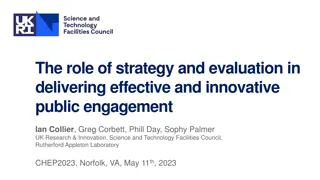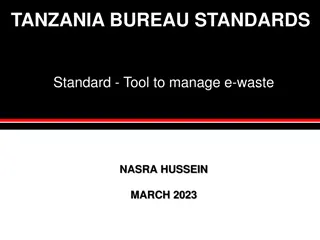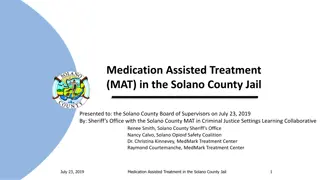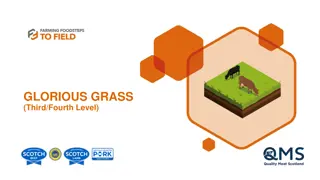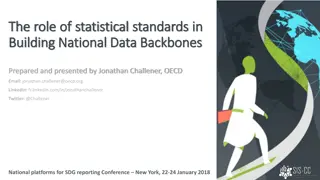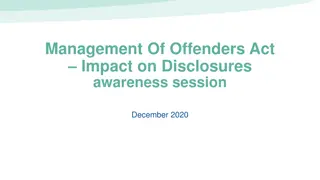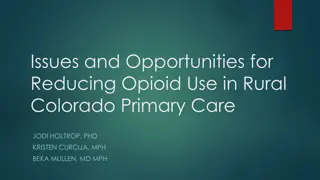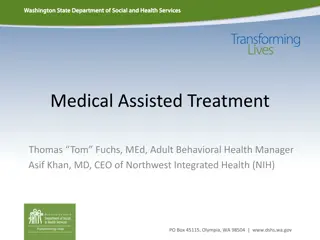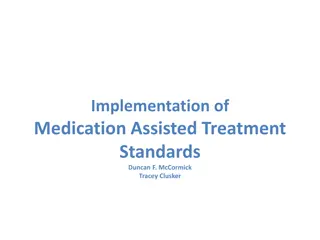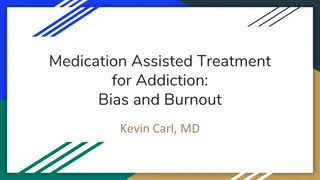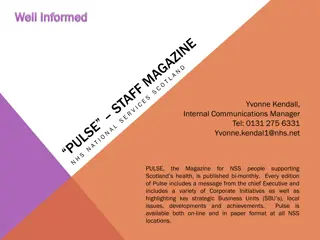Evaluation of MAT Standards and National Engagement Initiatives in Scotland
Evaluation of MAT standards in Scotland involved interviews with 111 individuals, highlighting access to prescribing and participant feedback. The National Engagement Group aims to provide a safe platform for drug users to express their needs, facilitated by experienced staff to influence policy decisions.
Download Presentation

Please find below an Image/Link to download the presentation.
The content on the website is provided AS IS for your information and personal use only. It may not be sold, licensed, or shared on other websites without obtaining consent from the author. Download presentation by click this link. If you encounter any issues during the download, it is possible that the publisher has removed the file from their server.
E N D
Presentation Transcript
MAT Standards Evaluation and National Engagement Group Jason Wallace Senior Development Officer Scottish Drugs Forum
MAT Standards Evaluation 111 people interviewed 95 in Community 16 males in Prison Males 53 females 41 Age 24-64 SDF Volunteers who were still in Medication Assisted Treatment carried out 76% of all interviews Core group of 8 volunteers Participants felt they were listened too by peers 80% of participants felt that improvements could be made to
MAT Standards Evaluation Access to prescribing Same day - 8 Days - 17 Up to 2 weeks - 15 Up to 1 month - 30 2-3 month - 13 4 month plus - 6 Unsure - 4 Waiting list - 2
Quotes from Participant having to take my medication in full view of everyone I find demoralising . I know every drug workers nightmare is giving out medication and then someone dying, but I really feel that I could have been up more About a month to 6 weeks . I think I could maybe have got it quicker, but my drug use was erratic, and I was missing appointments . I am happy with what I am at, it is not too much to get away and I feel responsible as I am promoted to the front of the chemist now, so it feels good . I quite like going every second day, I go for a walk in the morning, I would be fine going every day. With lockdown it gets me out the house and gives me structure and routine.
National Engagement Group To provide a safe place for individuals who take drugs to express their views on the support needed. Engagement group to be facilitated by staff with lived experience who will feed the information back to the relevant partners Scottish Government, Taskforce, Alcohol and Drug Partnership to support them in meeting the needs of the wider group. Every Voice Matters (no matter where you are in your life) Listening without conditions (Not always looking for the soluntions) Signposting Training Identifying Gaps (Supporting Scottish Government, Taskforce, ADPs to improve the services they Fund)
National Engagement Group Benefits Connecting with New/Disengaged clients Building Relationships Early warning of new drugs and trends on the streets People represent themselves and their community in the decision making process People become better informed of their Rights People are able to Advocate for themselves in Services People receive the type of services they need (Not what they are given)
Renewing to Reduce Drug Deaths David McCartney Clinical Lead, Lothian s & Edinburgh Abstinence Programme (LEAP) NHS Lothian
Why is residential rehab important? MAT standards (principles): part of recovery oriented systems of care (ROSC); to support recovery; person-centred person s goals at the heart; option of well-planned supported detox with/without residential options. National Clinical Guidelines (Orange Book) important option . Long established treatment intervention. Suited to higher complexity. Evidenced in scientific literature including outcome study from Scotland European norms: 11% vs <5% in Scotland Drug and alcohol deaths, wider harms, impact on families, communities, costs to society Lived experience families and service users want this option: rights
What are the challenges? Access to rehab is patchy, significant geographic variations, differing criteria Funding is difficult to get (impossible in some areas) Much still to understand particularly around aftercare Lack of knowledge & support, blocks, no standardisation Lived experience: Professionals helping/hindering; lived-experience professionals; waiting ++; families; funding; number of tries ; mental health as barrier; having to lie to meet criteria Need to attract academic interest and develop the evidence base
Whats been done/to be done? Working group reported last year - recommended Map services and pathways, capacity, need and demand Equitable access, standardised approach, simple pathways, Measure outcomes, develop research SG Priorities of capacity; improving pathways in and out of rehab significantly increased resource Implementing the recommendations work already started Consultation with ADPs to develop the work Consultation with lived experience groups & other stakeholders
Thanks david.mccartney@nhslothian.scot.nhs.uk











